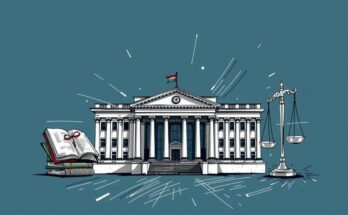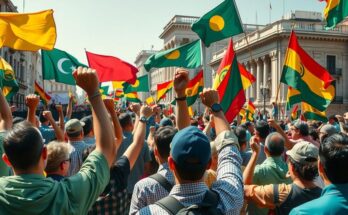South Africa is addressing its long-standing land inequality, a legacy of apartheid, through a new expropriation act aimed at land redistribution. However, the act has faced criticism and misinterpretation internationally, particularly by Donald Trump and Elon Musk, who argue it discriminates against White farmers. Domestic voices emphasize the act as a vital move towards rectifying historical injustices, while concerns about U.S. aid cuts and misinformation regarding land seizures persist.
South Africa grapples with a long-standing land inequality issue that dates back to apartheid, which ended in the 1990s. The 1913 Natives Land Act severely restricted Black ownership to a mere 7% of the land, later increased to 13%. Despite Black individuals representing 81% of the population, a 2017 audit revealed they currently own only 4% of private land, highlighting a stark disparity that remains evident over a century later.
In an effort to address these inequalities, President Cyril Ramaphosa’s government signed an expropriation act aimed at redistributing land. This act allows for expropriation under conditions deemed “just and equitable and in the public interest”; however, it explicitly prohibits arbitrary confiscation. To date, there have been no actual seizures of private property linked to this legislation.
The act has sparked renewed discussions about the racial tensions in South Africa and has caught the attention of President Donald Trump and entrepreneur Elon Musk. Musk has criticized the legislation, labeling it as “openly racist” against White farmers. Such claims have stirred controversy, with local residents expressing discontent over Musk’s remarks, asserting that he misrepresents the socio-economic realities at play.
David Van Wyk, a White South African farmer, argued that the notion of White victimhood is unfounded. He emphasized that White citizens generally earn significantly more than their Black counterparts and that the act is essential for addressing historical injustices. He remarked, “For Trump to create the impression that White people in South Africa are victims is nonsense.”
Conversely, others like Henk Smith from the Land Access Movement of South Africa believe the legislative approach could be better structured, advocating for compensation in expropriations with specific exceptions. This nuanced perspective recognizes the complexity of land reform while advocating for fairness.
In response to criticisms, President Trump issued an executive order cutting off $440 million in U.S. aid to South Africa, citing reasons surrounding violence against White landowners and condemning its stance on the Israel-Gaza conflict. The withdrawal of financial support has raised concerns about affecting crucial health programs and has led South Africa to negotiate with the Trump administration to restore aid.
Concerns about misinterpretation of the expropriation act have also been raised by South African authorities, emphasizing that the act does not allow for widespread land seizures. AgriSA, a farming body, labeled claims of unrestrained land confiscations as disinformation, affirming, “To be clear no seizures or confiscations of private property have taken place.” Meanwhile, the Solidarity Movement acknowledged the protests against certain laws without supporting claims of large-scale land grabs.
Despite the rhetoric surrounding land seizures, many South Africans fear potential removal from the African Growth and Opportunities Act, which could jeopardize market access and significantly impact the agricultural sector. The government remains vigilant against misinformation and is determined to navigate the political tensions effectively, reinforcing that South Africa will not succumb to external pressure.
In summary, the land inequality crisis in South Africa, rooted in a history of apartheid, is being addressed through the controversial expropriation act introduced by President Cyril Ramaphosa. While some figures like Trump and Musk portray the act as discriminatory, many local voices emphasize that it serves as a necessary step towards rectifying past injustices. The discourse continues amid rising tensions, particularly regarding international aid and perceptions of land ownership. Ensuring a balanced approach is crucial for South Africa’s social and agricultural stability.
Original Source: www.wral.com




